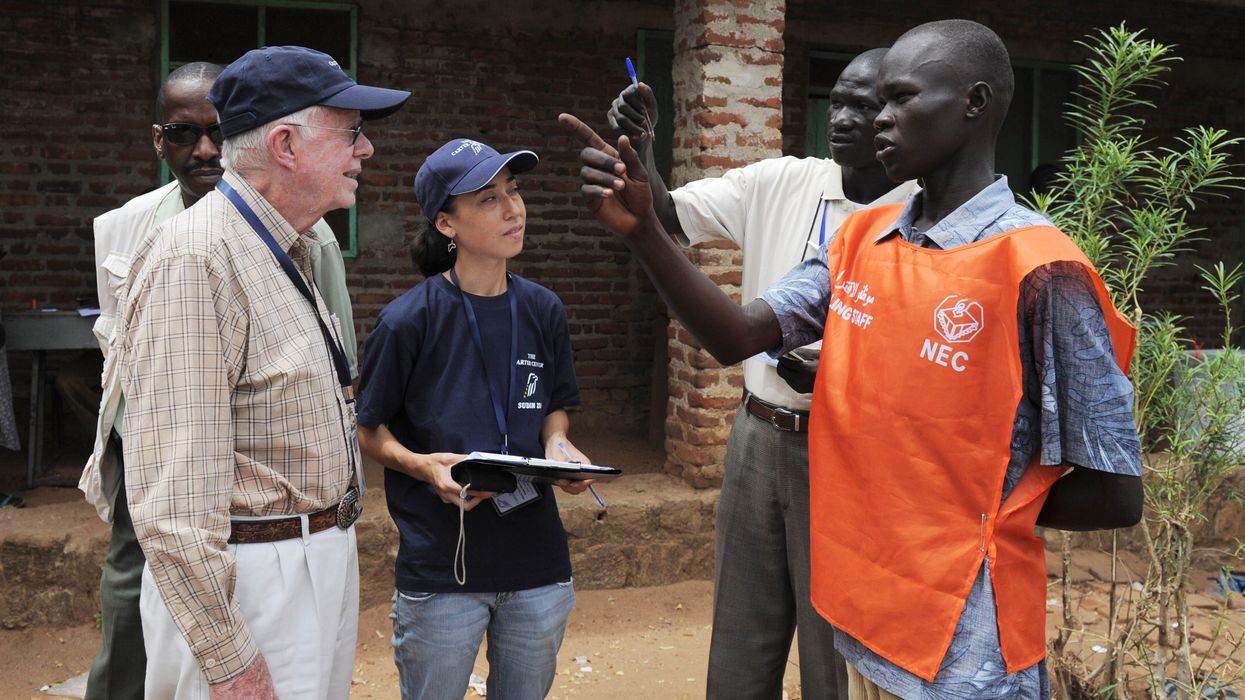CLARIFICATION: The headline and story were updated Oct. 18 to more accurately reflect the group's plans.
The Carter Center, which Jimmy Carter started after his presidency in part to assure fair elections in the developing world, is making explicit its plan for watchdogging an American contest for the first time.
The organization has unveiled one video explaining the basics of voting rights and balloting logistics, and another video encouraging patience if the presidential result is not known soon after the voting stops in 19 days because millions of mailed ballots will still need to be counted. It's working to help states and counties nationwide improve voter education and election transparency. And it's finalizing arrangements for "targeted observation efforts" mainly in Georgia, where the center is headquartered and which has a history of voter suppression and controversy over results tabulation.
The details underscore the degree of concern by human rights organizations about the adequacy of months of preparation for a safe and comprehensive Election Day that yields trustworthy results.
The Carter Center has monitored 111 elections in 39 countries since the 1980s and decided after the party conventions in August that the presidential contest merited something similar, citing a "backsliding" of American democracy that started a decade ago and has accelerated during the Trump administration.
"We've focused on places where democracy is either poised to take a step forward or in danger of taking a step backward," the head of the nonprofit's democracy program, David Carroll, wrote last week in sketching some of the coming efforts on the center's website. He said the nations where election observers have gone before almost all have domestic stresses similar to those in the United States now: "Countries characterized by political polarization, ethnic or racial divisions and fears that election results won't be accepted or seen as credible."
Since the center made the decision only six weeks ago, it decided it would be too ambitious to deploy volunteer observers at polling places — in part because that would require getting permission from as many as 10,000 election administering jurisdictions, many of which would likely resist on the grounds that the monitors would have partisan bias because the former president is a Democrat.
President Trump, who is trailing in the polls to former Vice President Joe Biden, has repeatedly questioned the integrity of the election and refused to commit to a peaceful transfer of power if he's defeated — mainly by alleging, without evidence, that an unprecedented use of absentee ballots in response to the coronavirus pandemic will assure widespread fraud.
Carter co-chaired a bipartisan commission that in 2005 described mail-in ballots as the easiest way to commit election fraud. But in May he announced he had changed his mind because the steady expansion in remote voting, and improved ballot security, had proved the process almost immune to cheating.
The former president reiterated that view last month after both Attorney General William Barr and the White House cited the 15-year-old report in efforts to discredit the practice. "I approve the use of absentee ballots and have been using them for more than five years," Carter said.
Part of the Carter Center's work this fall has been collaborating with the National Vote at Home Instituted on a report on how local election officials can make the absentee ballot process more transparent — and with the National Conference of State Legislatures on a report explaining election observer rules in all 50 states.
The other nations where Carter elections teams are working this fall are Côte d'Ivoire, Myanmar and Bolivia.
Carter turned 96 two weeks ago and is the oldest person ever to have been president. He was defeated by Ronald Reagan after a single term in 1980 and he and his wife, Rosalynn, started the humanitarian, peacekeeping and global democracy promotion organization two years later.




















